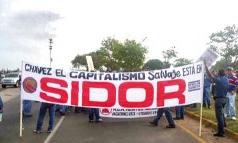Venezuela
The nationalization of the Techint steel mill
13/04/2008

After 9 strikes so far in 2008 and after suffering harsh repression
from the Guardia Nacional, the workers of Venezuela achieve a first
victory
In the early morning of Wednesday, April 9, after the failed
negotiations about the demands of the workers for a fair collective
agreement, the Vice President of Venezuela, Ramón
Carrizales, announced in front of representatives of Ternium Sidor
(belonging to the Argentinean group Techint) and of the union of
workers at the plant, that the enterprise would be nationalized.
Although the form through which Sidor (privatized in 1997), will pass
again to state control as not yet been specified, the fact seems to
indicate that a decision was already taken by the government to assume
control of the enterprise. But there is no doubt that this measure is
the result and the direct consequence of the struggle that the workers
at Sidor had been waging in recent months for better wages and working
conditions, among which the demand for renationalizing the enterprise
stood out. That is, a victory of the workers, and a measure that was
wrested from the government.
The struggle of the workers at Sidor had been the center of a set of
workers’ conflicts in Venezuela. Among the biggest private and state
enterprises, they add up to more than 55,000 workers who are carrying
out strikes, protests and other types of workers’ demonstrations of
the industrial sector. It is a matter of struggles at private
enterprises like Bridgestone Firestone, Mitsubishi Automotriz, Toyota,
Coca-Cola Femsa or in state-owned enterprises like Cadafe
(electricity) and the Corporación Venezolana de Guyana (aluminum),
among others. And it is exactly against this background that Chávez
decided to intervene directly in the conflict, by saying that Sidor
should respect the rights of the workers, after the failure of the
dirty job the government had been organizing through the Minister of
Labor. After having acted clearly on the side of the transnational
corporation, and after 23 days of silence complicit with the March 14
repression against the workers by his own Guardia Nacional. The
struggle of the workers at Sidor had been transformed into a symbolic
fight, and national solidarity had been growing, as was shown in the
big March 27 mobilization of more than 5,000 people, and a big
solidarity festival with more than 1,000 attending. As was also shown
in the March 29 multi-union meeting, where representatives of nearly a
hundred unions and workers’ and political organizations were present.
Important resolutions were approved at that meeting: a national
mobilization and a proposal for a national strike in solidarity.
So far this year, the workers at Sidor have carried out 9 strikes,
faced with the refusal by the transnational corporation of the
workers’ demand for a fair collective agreement, after more than 15
months of discussions unduly prolonged by the employer. In this entire
struggle, the workers always showed impressive drive that in many
cases passed over the leadership of the union. And the biggest thing
was the recent consultative referendum, organized by the SUTISS union
and the workers, where 83.8% of the workers at Sidor participated, and
which resulted in heavy support for forceful measures. In this way,
the maneuver orchestrated by the enterprise and Chávez’ Minister of
Labor, to have a referendum, was revealed as a new maneuver to
dismantle the confrontation behind the back of the union. It is this
struggle and the mobilizations of support that began to break the
media siege against the workers at Sidor in the government’s own media
to isolate the struggle, while the policy of the employer was being
broadcast without any limitations. And it was this struggle that ended
up by forcing Chávez to respond to the demands of the workers.
Up till now, when Chávez’ government has had to retake control of
enterprises that were privatized during the decade of the 1990’s, they
did it with compensations of millions of dollars, even at the value of
the stock market shares, as in the case of CANTV or ELENCAR. They
also established mixed enterprises with transnational corporations as
in the oil industry in the Orinoco Belt. Or, as they are currently
trying with sectors of the privatized cement industry, by proposing a
mixed association to transnationals like CEMEX of Mexico or LAFARGE of
France, by acquiring the shares at exorbitant prices, when they were
sold off extremely cheaply.
The government has not yet established the mechanism for Sidor,
although everything points to proposing a mixed company to Techint,
with the state as majority shareholder, by paying Paolo Rocca for the
stocks at market price (at present, the owners of Sidor have 59.7% of
the shares, the state has 20.3%, and workers and pensioners have
20.1%). If this happens, it would only be a "pseudo-nationalization,"
as Chávez has gotten us used to.
The workers at Sidor must immediately demand of Chávez, that he
approves the collective contract, by accepting its wage and
socioeconomic demands, as well as the immediate hiring of all the
temporary workers as permanent employees.
We, from the Juventud de Izquierda Revolucionaria, have always been on
the front line of active solidarity for the victory of the workers at
Sidor. For this reason, we now maintain that the struggle cannot stop:
it is a matter of demanding 100% renationalization of Ternium Sidor,
without any compensation, under direct workers’ management
Translation by Yosef Mikhah













